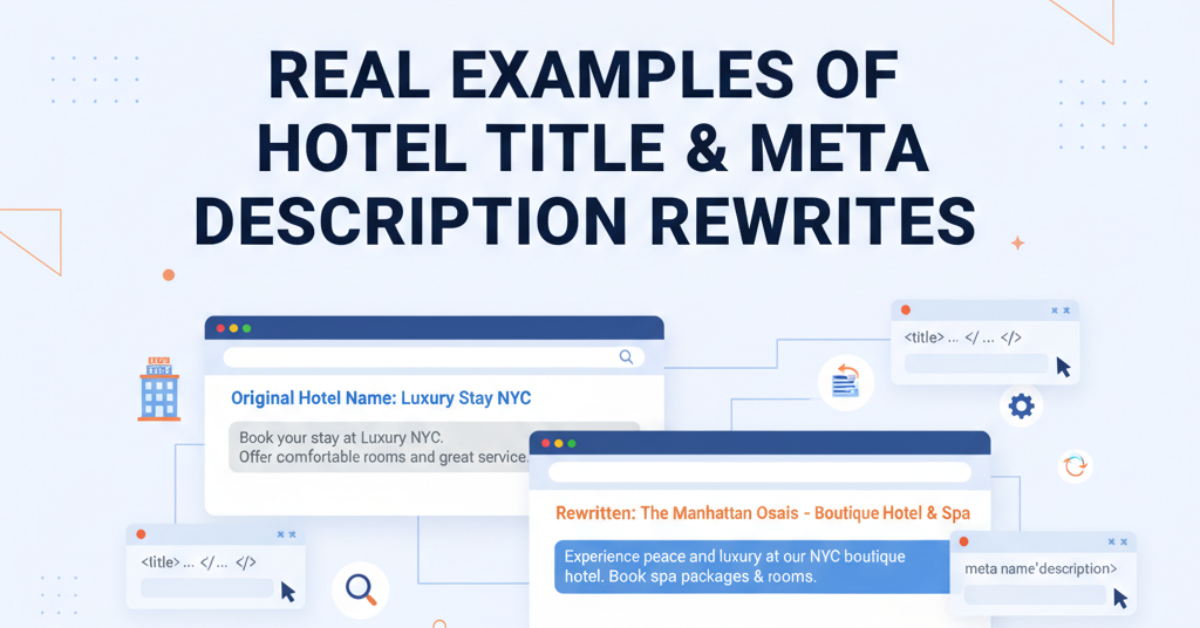Ever spent hours crafting the perfect page title for your hotel—only to see Google show something completely different in search results? You’re not alone. In 2025, studies found that 61–76% of website title tags are rewritten by Google, and it’s not just titles—meta descriptions for hotel pages can also be adjusted based on what Google thinks travelers are looking for.
At first, this might feel frustrating. After all, your carefully crafted title reflects your hotel’s brand, location, and unique features. But understanding why Google rewrites title tags and meta descriptions can actually work in your favor. For hotels, the right title impacts search visibility, click-through rates, and even bookings. A title that looks perfect on your page might get reordered, shortened, or tweaked to make it clearer, easier to read, and more appealing to travelers.
In this guide, we will break down why Google rewrites hotel titles, what triggers these changes and share real-life hotel examples—including before-and-after Google rewrites. You will also get practical, actionable steps to structure your titles and meta descriptions so they stay closer to your intent—or even perform better when Google adjusts them.
By understanding these processes, hotels can improve search visibility, attract more clicks, and increase bookings, while making sure your brand still shines in the SERPs.
Official Google Source:
Influencing your title links in search results
How Google Decides What Title to Show
When you publish a hotel page, you might think your <title> tag is the final word on what Google will display in search results. But that’s not always the case. Google doesn’t just take your title tag at face value—it considers several sources to decide what to show travelers.
For hotel websites, Google can pull titles from:
- Meta title tag – the title you set for the page.
- H1 and other headings – prominent text on your page, like room names or offer headlines.
- Page content – text that clearly signals the main topic, such as “Boutique Hotel in Downtown San Diego.”
- Structured data – schema markup that highlights your hotel, brand, or room details.
- Open Graph tags – often used for social previews but sometimes referenced by Google.
Studies show that 61–76% of title tags get rewritten across the web. For hotels, these rewrites often prioritize brand recognition and searcher intent.
Here are some real examples:
| Hotel | Original Title | Google Shows | Search Context |
| Downtown Luxe Hotel | Hotels in Downtown San Diego CA – Downtown Luxe Hotel | Downtown Luxe Hotel: Hotels in Downtown San Diego CA | Keyword: hotel in downtown San Diego |
| Mountain View Lodge | Beautiful South Lake Tahoe Hotel | Mountain View Lodge | Mountain View Lodge: Beautiful South Lake Tahoe Hotel | Keyword: South Lake Tahoe hotel |
| Heritage Inn | Santa Fe Hotels – Santa Fe Heritage Inn | Santa Fe Heritage Inn: Santa Fe Hotels | Keyword: Hotels in Santa Fe |
Even if your meta title tag looks perfect, Google may rewrite it to better match what travelers are searching for or make it more readable. This is why understanding how Google decides on titles is key for hotels: it helps you anticipate changes, craft more effective titles, and ultimately improve click-through rates and bookings.
Why Google Rewrites Titles and Meta Descriptions

So why does Google sometimes ignore your carefully written hotel title—or even your meta description? The truth is, Google’s goal is to show travelers the most relevant and readable information. Even if your title looks perfect to you, certain patterns can trigger a rewrite.
For hotel websites, common triggers include:
- Length issues: Titles that are too short or too long—like an overly descriptive room title or a packed promotional offer—can be rewritten to fit Google’s preferred 51–60 character range.
- Special characters: Symbols like pipes (|), dashes (–), or asterisks (*) may confuse Google, prompting it to simplify or reorder your title.
- Keyword stuffing or repetitive phrases: Using the same keywords repeatedly, such as “Best Hotel in Downtown San Diego – Best Hotel Near Gaslamp,” often leads Google to rewrite your title for clarity.
- Boilerplate phrases: Copying the same title format across multiple pages makes it harder for Google to distinguish pages, so it may rewrite titles to create variety.
- H1 mismatch: If your page headings don’t match your meta title tag, Google may adjust the title to better reflect the main topic of the page.
Meta descriptions are treated similarly. Google may rewrite them to better match traveler search intent, highlighting phrases or offers it believes users are most likely to click. For example, a generic meta description like “Book your room at our downtown hotel today” might be rewritten to emphasize location or unique amenities, such as “Stay at Downtown Luxe Hotel in Downtown San Diego – Steps from Gaslamp Quarter.”
Here’s a simplified view of how common triggers affect title and meta description rewrites:
|
Trigger |
Title Rewrite Likelihood | Meta Description Rewrite Likelihood |
|
Too short/long |
High |
Medium |
|
Special characters |
Medium |
Low |
|
Keyword stuffing |
High |
Medium |
|
Boilerplate phrases |
Medium–High |
Medium |
| H1 mismatch | Medium |
Medium |
Understanding these triggers helps hotel marketers craft titles and descriptions that are both search-friendly and traveler-friendly. Even if Google rewrites your content, following these guidelines ensures the changes usually enhance clarity, relevance, and click-through rates.
By anticipating what Google prioritizes—readability, brand recognition, and searcher intent—you can design your hotel page titles and meta descriptions to perform better in search results, while still keeping your messaging clear and on-brand.
Learn more:
About Hotel SEO Service
Real Examples of Hotel Title and Meta Description Rewrites

Here’s a real example we found from hotel websites. The title was good, but Google tweaked it for clarity, brand recognition, and traveler relevance. Seeing these changes can help hotel marketers understand what Google prioritizes when displaying titles and meta descriptions.
Example 1: Downtown Luxe Hotel
- Original Title: Hotels in Downtown San Diego CA – Downtown Luxe Hotel
- Google Shows: Downtown Luxe Hotel: Hotels in Downtown San Diego CA
- Search Context: Keyword: “hotel in downtown San Diego” | Brand: “Downtown Luxe Hotel”
Google moved the brand name to the front to make it immediately recognizable while keeping the location visible. This helps travelers quickly spot the hotel in search results.
Example 2: Mountain View Lodge
- Original Title: Beautiful South Lake Tahoe Hotel | Mountain View Lodge
- Google Shows: Mountain View Lodge: Beautiful South Lake Tahoe Hotel
- Search Context: Keyword: “South Lake Tahoe hotel” | Brand: “Mountain View Lodge”
Here, Google reordered the title for better readability and to emphasize the hotel brand first, which is useful for travelers searching by hotel name.
Example 3: Heritage Inn
- Original Title: Santa Fe Hotels – Santa Fe Heritage Inn
- Google Shows: Santa Fe Heritage Inn: Santa Fe Hotels
- Search Context: Keyword: “Hotels in Santa Fe” | Brand: “Heritage Inn”
In this case, Google highlighted the hotel brand first and paired it with the city for clarity.
Other examples from hotel room pages, promotional offers, and blog posts follow the same patterns:
- Titles that were too long or keyword-stuffed were shortened and reordered.
- Desktop vs mobile: On mobile, Google often truncates longer titles, so the rewritten version ensures the most important information appears first.
- Meta descriptions were sometimes rewritten to emphasize amenities, location, or promotions, making them more appealing to travelers scanning results.
These rewrites usually improve click-through rates (CTR) because the displayed title is clearer, scannable, and aligned with what travelers are searching for.
By reviewing these examples, hotel marketers can see that even if Google changes your titles, the goal is usually better readability, relevance, and brand visibility. Learning these patterns helps you craft titles and meta descriptions that Google is more likely to respect—or that benefit your hotel when rewritten.
Practical Steps to Reduce Unwanted Rewrites

Even with the best intentions, Google may adjust your hotel page titles and meta descriptions. While you can’t force Google to show your exact title, there are practical steps to reduce unnecessary rewrites and improve how your hotel appears in search results.
1. Keep Titles Concise
Aim for 51–60 characters. Longer titles may get truncated, while very short ones might lack clarity. For example, instead of “Book Your Luxury King Room at Downtown San Diego’s Downtown Luxe Hotel with Exclusive Offers”, a concise version would be:
Luxury King Room – Downtown Luxe Hotel, Downtown San Diego
2. Avoid Confusing Characters
Special symbols like pipes (|), brackets [], or asterisks (*) can confuse Google. Use simple separators like dashes or colons. Example:
Rooftop Pool & Bar – Mountain View Lodge, South Lake Tahoe
3. Align H1 with Meta Title Tag
Google checks if the main heading matches your title. Ensure your H1 reflects the title’s topic:
Luxury King Room – Downtown Luxe Hotel
4. Avoid Keyword Stuffing or Boilerplate
Repetitive phrases like “Best Hotel in Downtown San Diego – Best Hotel Near Gaslamp” can trigger rewrites. Make each title unique and descriptive.
Need Hotel Digital Marketing Services?
Get in touch with us.
5. Brand Placement
Place the hotel name at the end for rooms or offers, or front for homepage and high-recognition pages, depending on searcher intent. This balances brand visibility and readability.
6. Meta Descriptions Matter
Keep meta descriptions concise, relevant, and aligned with page content. Highlight key amenities, promotions, or locations without overloading keywords. Example:
Stay at Downtown Luxe Hotel in Downtown San Diego. Boutique rooms, rooftop pool, and close to Gaslamp Quarter.
7. Use Structured Data and OG Titles
Schema markup for rooms, offers, or events helps Google understand the page’s main entity. Ensure your og:title matches the meta title for consistency across platforms.
| Best Practice | Benefit |
| Concise titles | Less truncation, clearer message |
| Aligned H1 | Reduces title rewrites |
| No keyword stuffing | Avoids algorithm triggers |
| Structured data | Helps Google understand page content |
By following these steps, hotels can maximize the chance that Google respects your titles, while still benefiting from the algorithm’s adjustments when they improve clarity and click-through rates.
How to Monitor and Audit Hotel Titles

Once you’ve optimized your hotel page titles and meta descriptions, it’s important to keep an eye on how they appear in search results. Even with best practices, Google may still make adjustments. Regular monitoring ensures your pages stay effective and aligned with traveler intent.
Tools You Can Use
- Google Search Console: Check how titles and descriptions appear in the SERPs and monitor impressions, clicks, and CTR.
- SEMrush: Analyze which pages have rewritten titles and compare performance trends over time.
- Screaming Frog: Crawl your website to audit all hotel page titles, meta descriptions, and H1s quickly.
Steps to Audit Titles
- Export a list of all hotel page titles and meta descriptions.
- Compare them with the titles actually displayed in Google title search results.
- Track clicks, CTR, and bookings to see which pages perform best.
- Note patterns in Google rewrites title tags examples to understand why changes happen.
Friendly tip: Regular checks help you spot issues before they affect bookings or CTR. For example, if you notice a room page’s title is consistently rewritten in a way that reduces clarity, you can adjust the meta title or H1 to guide Google toward a better display.
Monitoring is not just about catching errors—it’s about understanding how Google interprets your hotel pages and learning what resonates with travelers. Using these insights, you can continually refine titles and meta descriptions to maximize both search visibility and bookings.
When It’s Okay to Let Google Rewrite Titles
Not every Google rewrite is a problem. In fact, sometimes letting Google adjust your hotel page titles or meta descriptions can improve clarity, readability, and click-through rates.
For example, a room page originally titled “Deluxe King Room with City View and Free WiFi – Downtown Luxe Hotel” might appear in search results as “Downtown Luxe Hotel: Deluxe King Room with City View”. The rewrite puts the hotel brand first, making it instantly recognizable to travelers, while keeping the key details clear.
Other cases include:
- Promotional pages: Google may highlight time-sensitive offers in the rewritten meta description.
- Location-based searches: Google can reorder the title to emphasize the city or neighborhood travelers are searching for.
Friendly advice: If the change looks clearer, more relevant, and clickable, it’s often best to let Google do its thing. These adjustments frequently increase impressions and CTR without any extra effort from your marketing team.
By understanding how Google interprets your hotel pages, you can focus on well-structured meta titles, H1s, and meta descriptions, while letting Google handle small tweaks that enhance traveler engagement. Following these practices ensures your google seo meta tags are effective, even when Google rewrites title tags.
Official Google Source:
Influencing your title links in search results
Conclusion
Google rewriting hotel page titles and meta descriptions is a common part of search results. While it can be surprising to see your carefully crafted title appear differently, these changes are usually meant to improve clarity, relevance, and click-through rates for travelers.
For hotel marketers, the key takeaway is to audit your H1s, meta titles, and page content regularly. Make sure titles are concise, aligned with page headings, and free from repetitive boilerplate or keyword stuffing. Ensure meta descriptions clearly highlight the hotel’s unique features, location, and offers. Using structured data and consistent og:title tags further helps Google understand your pages and respect your intended messaging.
At the same time, don’t fight every rewrite. Sometimes Google’s adjustments make your titles and descriptions more readable, clickable, and aligned with traveler intent—which can benefit your bookings.
Check your hotel titles and meta descriptions today — small tweaks can make a big difference in clicks, search visibility, and bookings. By working with Google’s changes instead of against them, you can ensure your hotel stands out in search results and attracts more guests.
Note: All hotel names used in this guide are fictional and for illustrative purposes only. They do not represent real properties. Any resemblance to actual hotels is purely coincidental.
General FAQs

Does Google rewrite title tags?
Yes. Google often rewrites title tags if it thinks a different title will better match what users are searching for. Even if your meta title tag is perfectly written, Google might show another title from your H1, page content, or structured data to improve click-through rate (CTR).
Why is Google rewriting my title tags?
Several reasons: your title might be too long or too short, contain confusing characters like brackets or pipes, have repeated keywords, or not match the H1 and page content. Google wants to show a title that makes sense to users and improves readability.
Are title tags still relevant for SEO?
Absolutely. Title tags are still important for ranking, clicks, and user experience. Even if Google rewrites them sometimes, writing clear, descriptive titles helps search engines understand your page and increases the chance that your preferred title is used.
How to fix duplicate title tags?
Duplicate title tags can confuse Google. Make sure each page has a unique meta title tag that accurately describes the content. Align it with the H1 and avoid boilerplate text. Tools like Google Search Console or SEMrush can help identify duplicates.
Why does Google change my meta description?
Google may rewrite meta descriptions for similar reasons as title tags: to better match search intent and show more relevant text in the search snippet. Always write clear, concise meta descriptions that summarize your page and naturally include important keywords.
What did Google change in 2025?
In 2025, studies showed Google rewrote 61–76% of title tags across websites. The focus is on matching user intent, improving CTR, and using multiple signals like H1s, page content, and structured data to pick the displayed title.
Why has Google changed its approach?
Google aims to provide searchers with titles that best describe the content and match their queries. This means the search engine sometimes ignores the original title you set in favor of one that’s clearer, shorter, or more relevant for different search terms.

